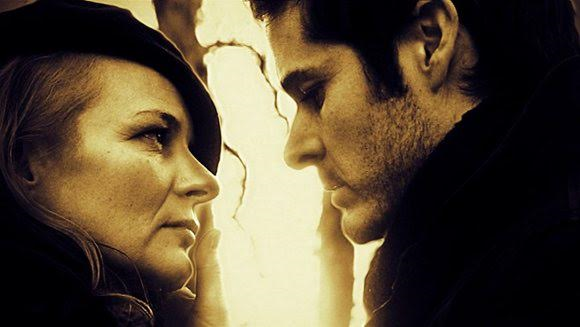
British film audiences tend to have a hard time with ‘heart on sleeve’. Possibly the only facet of US culture that we haven’t imported, it is a type of film making we tend not to embrace, mainly because we Brits are more reserved when it comes to emotion.
Writer/director Maeve Murphy’s powerful drama BEYOND THE FIRE, finds itself between a rock and a hard place, in that it has a great deal to say on a variety of important subjects (rape, religious angst, guilt and relationships), yet approaches all of these with an openness and emotional honesty lacking in much cinema produced in this country. It’s a bold approach, the kind of film making style often associated with, say, Ken Loach.
That the approach succeeds is possibly her biggest triumph, yet there are many reasons to revisit or indeed, discover this over-looked picture from 2009, for the first time, not least as Murphy’s most recent work TAKING STOCK, has just been released, it’s comic tone a complete shift, tonally, from what we see within her work here, a clear indicator of one of our more versatile film makers, not afraid to tackle multiple genres.
And never at the expense of substance.
BEYOND THE FIRE follows Sheamy (Scot Williams), an ex-priest in training, who travels from Ireland to Liverpool, after spending some time in prison. He’s searching for an older priest he once knew, and while on this journey, connects with Katie (Cara Seymour), a band manager whose past is just as complicated.
The story progresses as a character piece, the developing relationship between Sheamy and Katie allowing them to open up, revealing each others flaws and troubled history. Katie is a rape victim, while Sheamy’s past is no less horrific, as is the reason for his prison time.
Scot Williams does most of his best work without saying a word. Given the majority of the film’s dramatic heavy lifting to do, his performance is most riveting to watch in the quieter moments, his body language suggesting a man with the weight of the world on his shoulders. There is a torment behind the eyes and a world weariness, Williams playing Sheamy as a man attempting to shake off the layers of his past, much like a snake discarding a layer of skin.
Cara Seymour, one of our country’s greatest secret weapons, excels in roles that require the delicate balance of strength and vulnerability. In the character of Katie, she gives it her all, crafting a portrait of love and grief that is utterly real, her performance delicate and natural. Not an ounce of vanity is to be found here, in what is a brave, difficult part.
But then, Seymour has worked with VonTrier, so she can handle anything.
The notion of forgiveness is the film’s most powerful asset.
Every character presented to us has a sin to confess, or a past to run away from. Religion plays its part too, providing a moral dilemma: how can you possibly confess to an institution that betrays?
“Whatever I’ve done, I’ve atoned for it.”
There is also a wonderful balance in the notion of the redeeming power of love, beautifully encapsulated in an image, towards the end, of a pair of handcuffed hands, which seem to form the shape of a heart.
Murphy’s direction is perfectly balanced in this way: energetic when it needs to be, still in the film’s more reflective moments, focused on the character’s faces, unafraid to get close to the pain. Her background as a theatre director is evident only in the nature of the performances she gets from a cast who were probably paid in cups of tea. She’s an actors director with a cinematic eye.
Given the constraints of the film’s budget, it is incredibly admirable that Murphy explores such weighty subjects, and seriously too.
The issue of child abuse within the church is still, and always will be, a tough subject to work with, yet BEYOND THE FIRE could never be accused of simply throwing stones at that particular window.
How much simpler it would be to take the easy way out, and yet, while the film received some criticism for being too ‘neat’ in its resolutions, I like to think that, considering what the characters have been through, the ending is earned.
Really, how much pain do people want?
